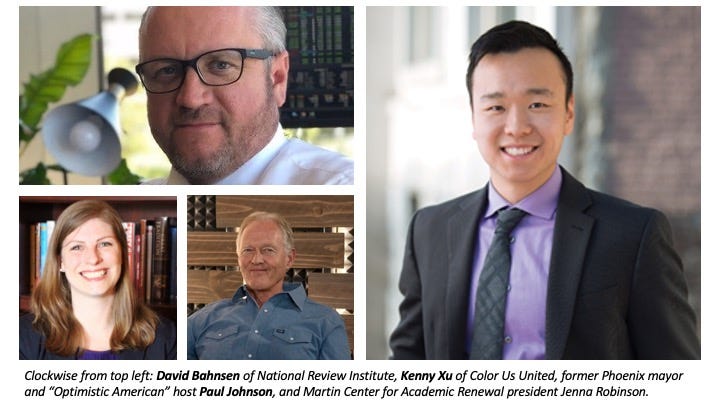More leaders join conservative “A-List”
FreeCons represent a variety of backgrounds, home states, and leadership roles
Shortly after we released the Freedom Conservatism Statement of Principles, Politico called our signatories “an A-list group of conservative writers, scholars and activists” who’ve declared that “political freedom cannot long exist without economic freedom, the free enterprise system is the foundation of prosperity, and the skyrocketing federal debt is an existential threat.”
Quite right — and since our FreeCon project went live last month, dozens of prominent conservatives from across the country have joined our ranks. Among the recent signatories to the statement of principles are:
Experienced leaders who’ve served their communities in federal, state, or local office, including former Florida governor Jeb Bush, former U.S. Under Secretary of State James Glassman, former Phoenix mayor Paul Johnson, former Maryland lieutenant governor and RNC chairman Michael Steele, and Bill Hoagland, former director of the Senate Budget Committee.
Key voices in the media such as David L. Bahnsen of the National Review Institute and Acton Institute, Alyssa Farah Griffin of ABC’s “The View,” nationally syndicated columnist and Bulwark policy editor Mona Charen, and producer Scott Immergut of the “Uncommon Knowledge with Peter Robinson” and “Good Fellows” programs.
Accomplished professors, scholars, and education-policy leaders such as Andrew Taylor of North Carolina State University, Steven Sheffrin of Tulane University, Jenna Robinson of the Martin Center for Academic Renewal, Ben DeGrow of the Foundation for Excellence in Education, Jeffrey Bailey of Grace Baptist Christian Academy, James Manley of the College of Central Florida, Colin Sharkey of the Association of American Educators, John Coleman of Ave Maria University, and Johnny B. Davis of Liberty University.
Key grassroots activists, coalition builders, and movement leaders such as Adam Brandon of FreedomWorks, Kenny Xu of Color Us United, Claire Kittle Dixon of Talent Market, John Dodd of the North Carolina Center-Right Coalition, Kevin Riffe of the West Virginia Center-Right Coalition, Joel White of the Council for Affordable Health Coverage, Stacy Hock of the Texas Public Policy Foundation, Benjamin Rothove of the Keep Nine Coalition, Mike Palicz of Americans for Tax Reform, Buckley Morlot of Leaders on the Rise, Drew Bond and John Hart of the Conservative Coalition for Climate Solutions, and Wayne Thorburn, former executive director of Young Americans for Freedom.
And think tank executives, litigators, and policy analysts such as Aaron Stover of the Heartland Institute, Dan Winslow of the New England Legal Foundation, Timothy R. Snowball of the Freedom Foundation, McKenzie Richards of the Pacific Research Institute, John Phelan of Minnesota’s Center of the American Experiment, and Dan Greenberg of the Competitive Enterprise Institute.
Although Politico correctly described our signatories as leading voices in American conservatism, the magazine did err in using the phrase “a cross-section of Washington think-tank worthies.” While we’re proud to count among our number many policy experts who work the nation’s capital, most of our signatories work elsewhere: in grassroots organizations, private firms, universities, media outlets, and state capitals from California to Connecticut, Michigan to Mississippi, and everywhere in between.
Red line drawn
Writing in The American Spectator last week, Alex Adkins commended the Freedom Conservatism project for taking “a stand against progressivism and populism.” While crediting National Conservatives for advancing some worthwhile ideas, Adkins faulted them for promoting government encroachments on free enterprise and for ignoring the 10th Amendment to the U.S. Constitution, which reserves to states or the people themselves — acting as individuals or in voluntary associations — powers not specifically delegated to the federal government.
“Freedom conservatives are drawing a red line in America’s political discourse, providing a roadmap for conservatives and Americans who love freedom,” Adkins wrote. “Populism and progressivism are built on grievance. Conservatism is ordered toward liberty for all. Freedom conservatism will help preserve the American experiment for generations to come.”
Other coverage
In recent days, our statement of principles has been promoted by the Independent Women’s Forum, the California Libertarian Report, and The Fund for American Studies. The president of TFAS, Roger Ream, is one of our signatories, as are Ryan Wolfe, director of its Center for Excellence in Journalism, and senior scholars Donald Devine and Donald Boudreaux.
New FreeCon signatory Ralph Benko of the Prosperity Caucus wrote in Newsmax last week that the movement’s supply-side principles mirror earlier efforts to promote economic growth and opportunity by reforming the tax code, regulatory agencies, monetary policy, and the federal budget process. “Embrace free markets within a strong social, political and moral framework,” Benko advised. “Call it Freedom Conservatism.” Agreed!

